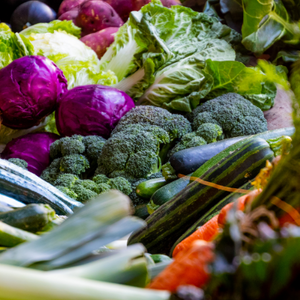How to Work Towards a More Sustainable Diet
April 26, 2021

Even though Earth Day has passed, we can still carry its messages with us every day of the year. According to the World Health Organization (WHO), food production accounts for 20–30% of global greenhouse gas emission and up to 66% of water usage.
As it turns out, what’s good for you is good for our planet too! According to the EAT-Lancet Commission, a group of scientists from 16 countries dedicated to studying the impacts of our diet, found that food production is the world’s largest cause of environmental change. They recommend increasing your vegetables, whole grains, nuts, and legumes. Similar to the Mediterrenean diet, they advise consuming low amounts of refined grains, added sugars, red meat, and processed foods.
Here are a our best tips on how to eat sustainably and keep your diet on track:
-
Bye butter. Ingredients like butter have a bigger environmental impact than ingredients like olive oil. Besides just being healthier for the planet, olive oil is a lot lower in saturated fats - too much saturated fat in your diet can lead to a myriad of health problems. For a neutral olive oil that’s perfect for every aspect of cooking, pick up some of our Seka Hills Arbequina Extra Virgin Olive Oil.
-
Go local. Some of the best food available is grown right in your backyard! Buying local also means better quality, cheaper prices, and a smaller carbon footprint compared to a grocery store item. This great website helps to find farms in your area that can even deliver your food to you. Don't forget to bring your reusable containers for your next farmers' market trip!

-
Eat seasonal. Do you ever stop to think about how much energy it takes to get strawberries here in the middle of January? Eating seasonal reduces carbon emissions that it takes for import off-season foods. Whether you have a massive backyard or tiny container garden, now is the time to start planting for a delightful summer salad.
-
Do Your Research. Not all food products are created equal - especially when it comes to their growing or farming practices. When you're shopping look for the following sustainable certifications: Animal Welfare Approved, Global Animal Partnership, Monterey Bay Aquarium Seafood Watch, Certified Naturally Grown, The Non-GMO Project, Soil Association, Good Food Awards, and the Rainforest Alliance. Supporting a family farm or farmers' market gives you an opportunity to meet the person that grew you food and know their growing practices.

-
Diversify your diet. Historically, 6,000 crops have been used for food, fewer than 200 are used today and only nine account for nearly 70% of all food produced. Relying on the same crops causes a lack of diversity in nature, and makes our food supply vulnerable to pests or diseases.
-
Practice plant-based meals. One of the easiest ways to start changing your diet to be more sustainable is eating less meat. It helps you branch out and find new recipes to try, new cuisines to explore, and you might even discover your new favorite food! Need inspiration? Here are a few of our favorites.
Next time you go shopping, keep these principles in mind for better personal and planet health!


